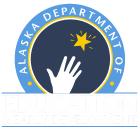- Cama-i, quyana tailuci!
- (Central Yup’ik)
- "Greetings, thank you for coming!"
Alaska Educator Qualifications
“Alaska needs to ensure that low-income and minority students are not taught at higher rates than other students by ineffective, out-of-field or inexperienced teachers.”
Alaska’s Equity Plan focuses on increasing the number of experienced teachers and reducing educator turnover in low-income, high-minority, and high-needs schools and districts. Like many other States, Alaska has recruitment and retention struggles. These recruitment and retention struggles play a key part in disproportionate rates of low-income and minority children in Title I schools that are served by ineffective, out-of-field, and inexperienced teachers. Since 2020, the State of Alaska has been working to improve teacher retention and recruitment. The first phase began with a directive by Governor Michael Dunleavy to form a working group to identify the root causes of Alaska’s teacher retention and recruitment issues and to propose solutions to better attract and retain great teachers. The second phase included the publication of a Teacher Retention and Recruitment (TRR) Action Plan, along with complete TRR Survey Results and additional appendices and findings. The state of Alaska is currently in the third phase – implementation. More information is available here: https://education.alaska.gov/trr.
DEED’s State Report Manager (SRM) currently produces reports at the school level that show the rates of low-income and minority children in Title I schools that are served by ineffective, out-of-field, and inexperienced teachers. The most recently reported data was included in Alaska’s approved ESSA State Plan. DEED will publicly report current progress towards ensuring that low-income and minority children in Title I schools are not served at disproportionate rates by ineffective, out-of-field, and inexperienced teachers. The data will be added to Alaska’s Equitable Access Plan to Excellent Educators website: https://education.alaska.gov/teachercertification/aep.
Teachers
|
Ineffective |
Out-of-field |
Inexperienced |
|
An “ineffective teacher” is:
This is district support or a plan of professional growth only as a result of the evaluation system as defined in state regulation. |
An “out-of-field teacher” is:
An endorsement can be earned with a passing score on an endorsement-related content area exam and two years of experience in the content area.
Parents of students in Title I schools must be notified of out-of-field teachers. |
An “inexperienced teacher” is:
Student teaching or other similar preparation does not count as experience.
|
Paraprofessionals
A "Paraprofessional" is a person who is not required to have a professional license or certification and who, under the supervision of a teacher or other professional educational service provider, provides instructional or other educational support to a student.
Paraprofessionals can play important roles in improving student achievement where they can reinforce and augment a teacher's effort in the classroom. Alaska requires instructional paraprofessionals meet high standards of qualification under Alaska regulation 4 AAC 04.220.
A paraprofessional is not required to meet the requirements if the paraprofessional
- acts as a translator to enhance the participation of English learners or students with disabilities;
- has instructional-support duties that consist solely of conducting parental involvement activities; or
- has only non-instructional duties, including providing technical support for computers, providing personal care duties, or performing clerical duties.
Qualifications
Instructional paraprofessionals must meet one of the following qualifications:
|
Method 1 |
Method 2 |
Method 3 |
|
|
|
|
Method 4 |
Method 5 |
Method 6 |
|
|
|
|
Method 7 |
||
|
|
|
Paraprofessional Standards Checklist
All instructional paraprofessionals should have the paraprofessional standards observed and verified on the Paraprofessional Standards Checklist.
Paraprofessional Standards
A paraprofessional will demonstrate the ability to;
- practice ethical and professional standards of conduct and continued professional improvement;
- understand how students learn and develop and understand how to assist in providing opportunities that support students’ intellectual, social and personal development;
- understand the content areas and apply the elements of effective instruction to support teaching and learning activities;
- motivate and assist students to build self-esteem, develop interpersonal skills, and strengthen abilities in order to become more successful;
- understand the distinction between the roles and responsibilities of professionals, paraprofessionals, and support personnel in the areas of assessment, diagnosis, and evaluation;
- adhere to communication protocols with colleagues, community members, and parents including following instructions, sharing information, and using interpersonal skills to become an effective member of the instructional team;
- understand and implement district and state guidelines for protecting the safety, health and wellbeing of students and staff, including the school district’s crisis response plan; and
- utilize technology to assist and enhance teaching and learning.
Timeline
Districts are expected to have all instructional paraprofessionals meet requirements by the 2023-24 school year. DEED has established a transition period allowing districts until the 2020-21 school year to determine whether instructional paraprofessionals meet the requirements.
Instructional Paraprofessional Requirements Information Sheet
Further information can be found at Title I-A Paraprofessional
